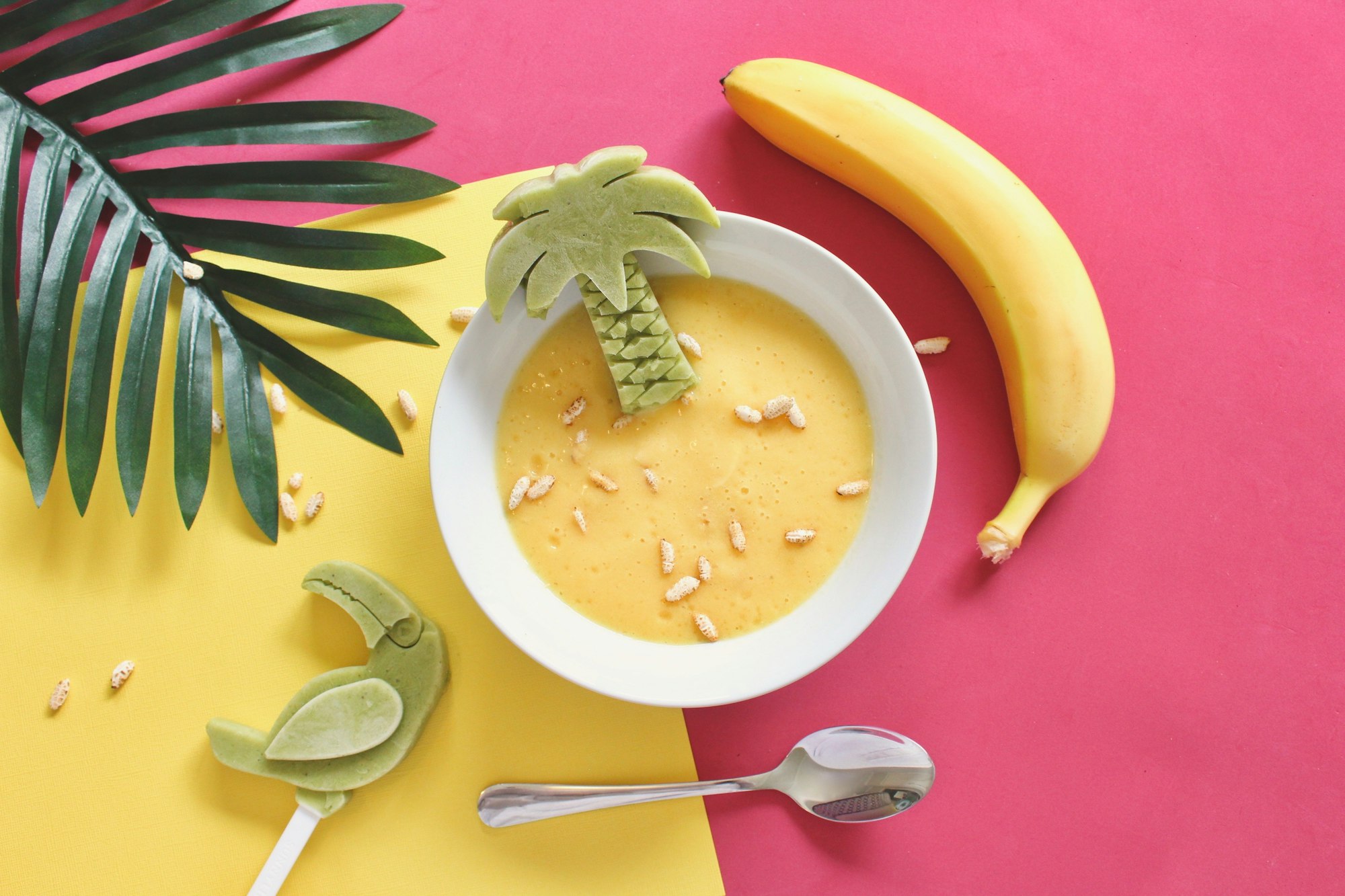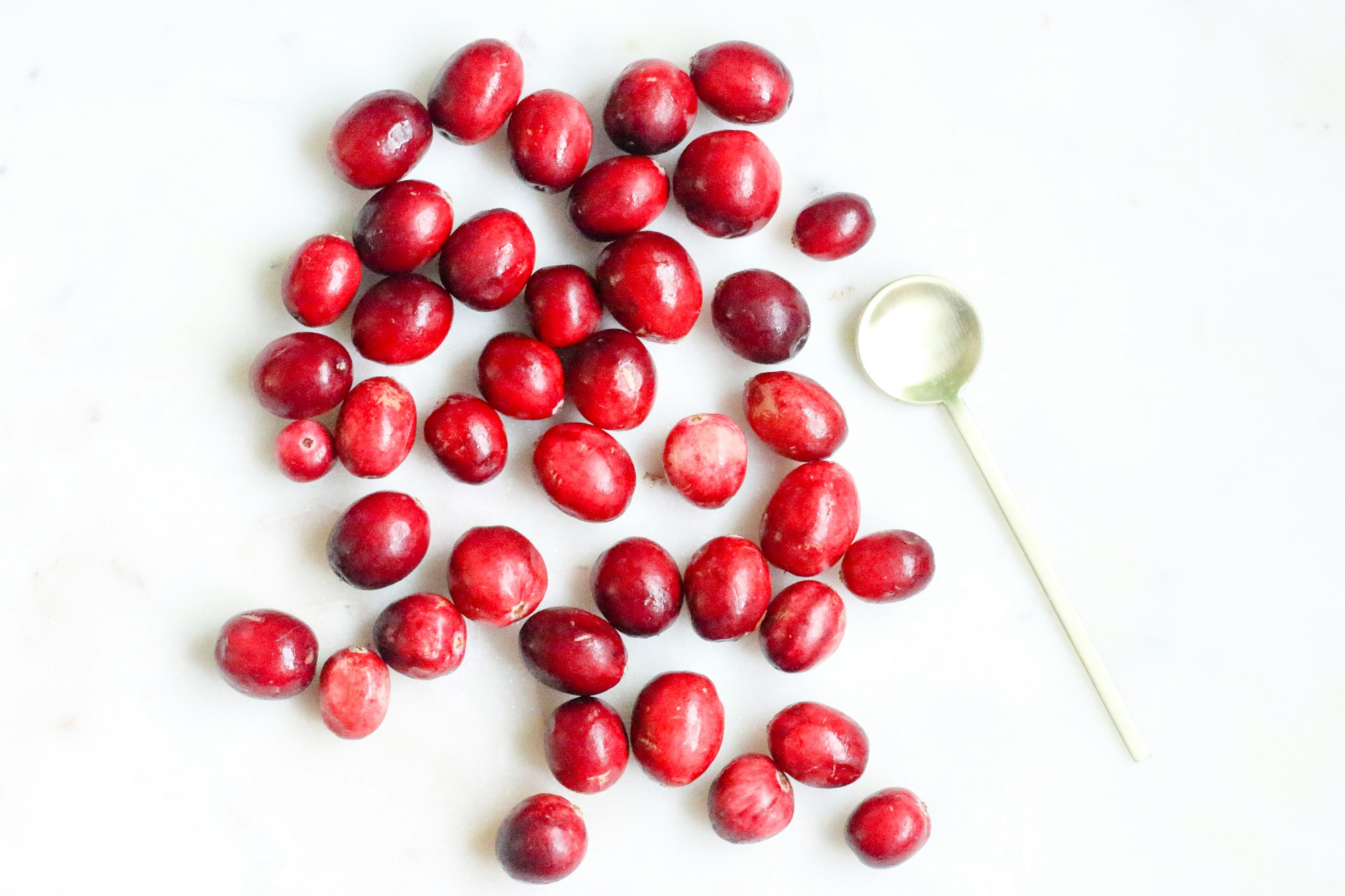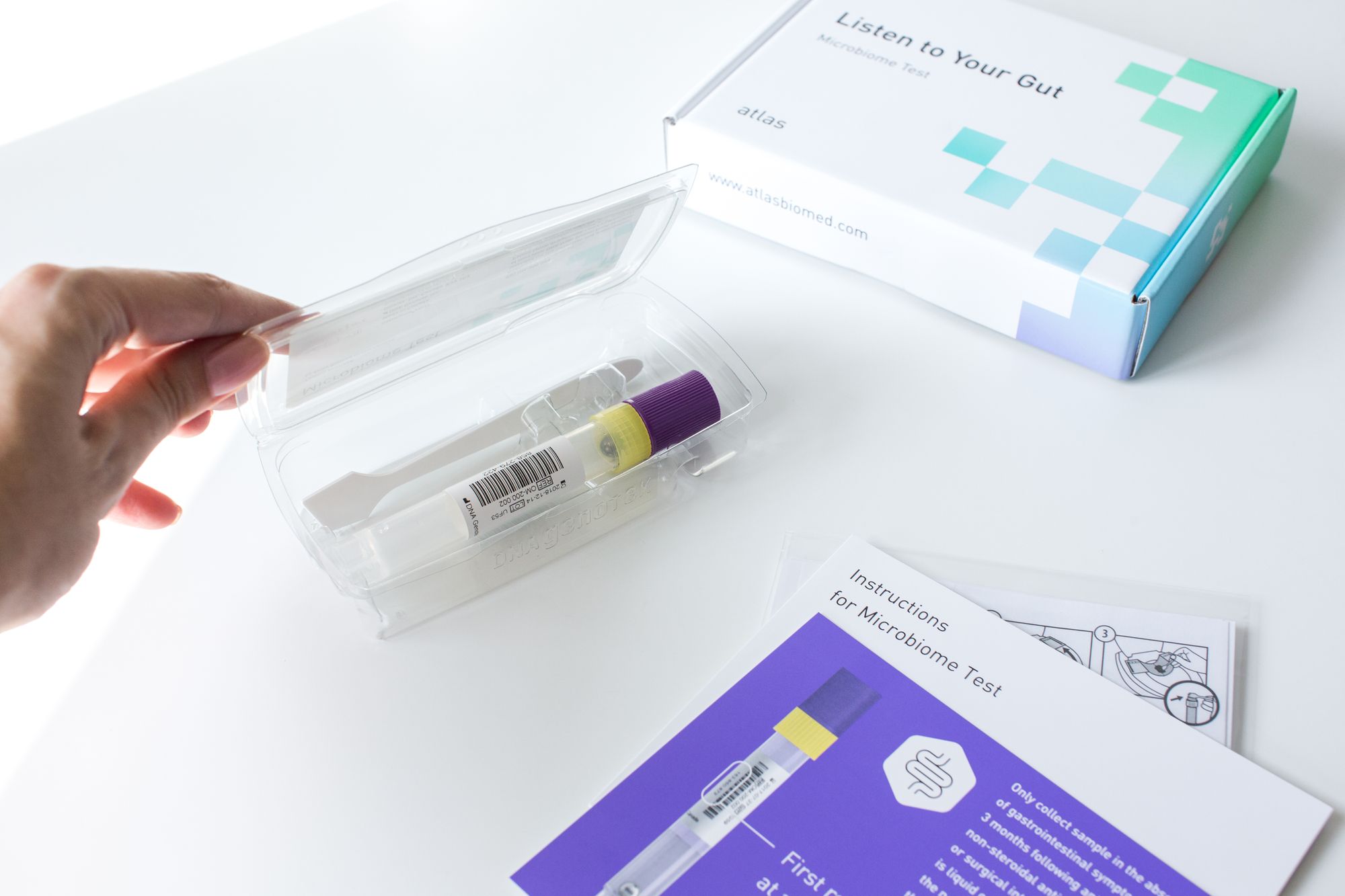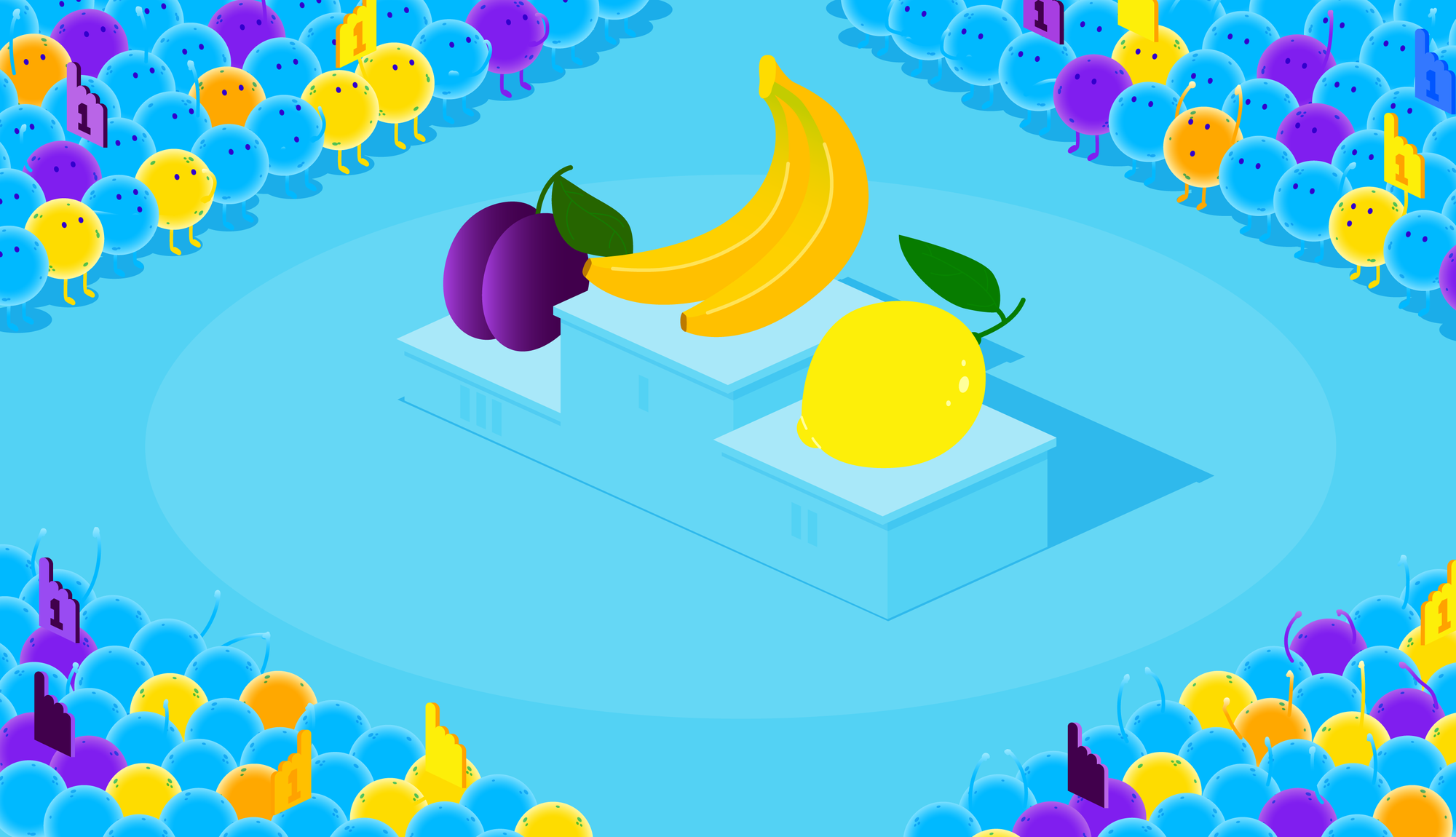Being a superhuman is easier than you think. Here is the ultimate list of healthy fruits (and berries) for your gut and microbiome.
Our team have crunched the numbers and created the list of fruit most recommended to Atlas Microbiome Test users to strengthen the superpowers of the bacteria in your gut. This ecosystem, called the microbiome (or microbiota), is not only essential for good digestion, but for whole body health too.
The trillions of microorganisms in your colon make up an incredible new organ that trains the immune system, influences body weight, and even helps to protect you from diseases. That’s why it’s important to nourish your good bacteria with prebiotics, most of which are rich in dietary fiber found in plants, such as most fruits.
Table of contents
- 1. Bananas, one of the best fruit for health
- 2. Peaches, a versatile summer fruit
- 3. Apples, just eat one per day
- 4. Figs, the seasonal fruit in demand
- 5. Cranberries, the tiny super-fruits
- 6. Grapefruit, a tart friend for health
- 7. Pomegranates, the edible ruby jewel
- 8. Grapes, little morsels of greatness
- 9. Pineapples, for all your enzyme needs
- 10. Kiwis, the fruit with edible skin
- 11. Blueberries, nutrition powerhouses
- 12. Avocados, the savoury fruit
Eating healthy is not as boring as you think. This superfruit guide will tell you all about the most healthy fruits and what is the best fruit for you. Remember that the adult body needs at least 25-30g of fiber per day.
Bananas, one of the best fruit for health
| Superfruit (raw) |
Fiber, % per 150g (Recommended Daily Value) |
|---|---|
| Banana | 14–23% |
Bananas* are the powerhouse of dietary fiber, protein, potassium, vitamin B6, and manganese. They are known to positively affect cardiovascular health, digestion, and weight control.
They come in green, yellow, and red, and can be eaten as a snack, added to desserts, or used as a savoury side dish. Green bananas (incl. plantains) are not sweet, which makes them a great and versatile alternative to potatoes and grains for the main course because they can be boiled, fried, or baked.

Yellow and red bananas are sweet, and the riper they are, the more sugar they contain. Studies show that bananas make people feel full for longer, which is good for body weight management. Despite the popular belief, the dopamine in bananas does not affect your mood.
Plantains and unripe bananas are rich in resistant starch, and they contain inulin too, both are prebiotic fibers that feed good gut bacteria. They use it to make short-chain fatty acids that fight inflammation and keep your gut lining healthy.
* ☝️TOP FRUIT☝️ Green bananas are recommended to Atlas Microbiome Test users.
Peaches, a versatile summer fruit
| Superfruit (raw) | Fiber, % per 150g (RDV) |
|---|---|
| Peach | 10% |
Peaches* are an ancient fruit that appeared 8,000 years ago in China. Rich in antioxidants, vitamin C, and, of course, fiber, these fruit aid digestion, support the body’s immune system health and combat inflammation.
Peach super fruit health benefits
- Digestion: fiber nourishes gut bacteria and promotes regular bowel movements.
- Cardiovascular health: helps control cholesterol levels and blood pressure.
- Skin health: glucosylceramide helps the skin retain moisture.
- Cancer prevention and treatment: polyphenols with anticancer properties.
Peaches of every shape, colour, or size are delicious in any. Add them to smoothies, on top of yoghurt, fruit salads, and even ice cream. You can even grill them on the barbecue (after marinating them with herbs, spices, and olive oil) and serve them up with shrimp!
* ☝️TOP FRUIT☝️recommended to Atlas Microbiome Test users.
Apples, just eat one per day
| Superfruit (raw) | Fiber, % per 150g (RDV) |
|---|---|
| Apple | 12% (with skin) |
Apples* are rich in antioxidants, vitamins, and minerals that keep your body in optimal shape. Studies show that eating apples regularly can improve heart health, maintain healthy body weight, and help prevent chronic diseases, like diabetes type II.

This fruit is rich in pectin, a type of soluble prebiotic fiber that nourishes good gut bacteria and helps them make short-chain fatty acids (SCFAs). These molecules influence appetite, weight gain, gut lining health, and the immune system. Pectin is also important for regular bowel movements and preventing constipation.
Adding apples to the diet is easy as they go well almost with any type of food — sweet or savoury. Eat an apple as a snack, add it to fruit salads, bake with a duck, serve with pork, or make an apple strudel. You can even ferment it with cabbage to make sauerkraut, which is a probiotic food.
* ☝️TOP FRUIT☝️recommended to to Atlas Microbiome Test users.
Figs, the seasonal fruit in demand
| Superfruit (raw) | Fiber, % per 150g (RDV) |
|---|---|
| Figs | 7% |
These scrumptious members of the mulberry family are delicious both fresh and dried. Fresh figs* are a seasonal treat because they grow in warm, sunny countries and come in green-yellow-purple colours.
Figs are incredibly rich in fiber – just one serving will supplement your daily intake of fiber by 4–5g, which is nearly a fifth of the recommended amount. They contain soluble fiber which makes you feel fuller, and insoluble fiber that helps prevent constipation.
Figs are a wonderful snack that can supplement a salad, yogurt, desserts, or pastries. They can be stuffed with blue cheese and baked, or added to a salad with arugula. That said, fresh figs are one of the best snacks you can treat yourself too!
* ☝️TOP FRUIT☝️recommended to Atlas Microbiome Test users.
Cranberries, the tiny super-fruits
| Superfruit (raw) | Fiber, % per 150g (RDV) |
|---|---|
| Cranberry | 20% |
Size does not matter, and cranberries* are the “living” proof of that. Rich in antioxidants, they are a powerful anti-inflammatory weapon that prevent free radicals from wreaking havoc in your cells. Cranberries also contain d-mannose, a molecule of interest to the scientific community, which may explain why these berries can help treat urinary tract infections.

On top of that, cranberries are a powerful prebiotic that support the growth of beneficial bacteria, like Bifidobacteria and Akkermansia that boost gut lining integrity, support the immune system, fight inflammation, and ward off bad bacteria.
However, cranberries are tart little berries that can make your mouth pucker. Make them more palatable with a healthy sweetener, like stevia, or blend them up with other superfruit to make a delicious smoothie.
* ☝️TOP FRUIT☝️recommended to Atlas Microbiome Test users.
Grapefruit, a tart friend for health
| Superfruit (raw) | Fiber, % per 150g (RDV) |
|---|---|
| Grapefruit | 15% |
Citrus fruits are well known for their mood and health benefits. Grapefruit are tangy, low in calories, delicious, and full of vitamins. Eating a grapefruit before or after a meal helps the body feel satiated and improves digestion.
Studies show that grapefruit has a positive effect on the gut microbiome because it contains polyphenols, like naringin, that boost the production of short-chain fatty acids, help inhibit the growth of bad bacteria, and increase the presence of commensal bacteria that live in harmony with your good bacteria.
Many people recommend removing the membrane to avoid the bitterness of grapefruit. However, doing so strips the fruit of most of its fiber and many nutrients, so try to live with it if you can. Eat a few wedges as a snack, add them to a salad, a smoothie, or serve with fish and seafood.
Pomegranates, the edible ruby jewel
| Superfruit (raw) | Fiber, % per 150g (RDV) |
|---|---|
| Pomegranate | 27% |
Underneath its leather exterior, the pomegranate hides ruby-red, juicy seeds that are a perfect balance of tart and sweet. Celebrated by the ancient Egyptian, Greek, and Persian civilisations, it is a delicious powerhouse of nutrients.

This fruit is abundant in antioxidant and prebiotic polyphenols that support the presence of probiotic Bifidobacterium and Lactobacillus microbes in your gut. These phytonutrients even combat bad bacteria that are associated with infections and inflammation.
Pomegranate is widely popular in many cuisines worldwide, accompanying equally well sweet and savoury dishes. The seeds can be sprinkled over granola, salads, or desserts. You can even get creative and look to Iranian cuisine for something new, like fesenjan – a traditional pomegranate stew with chicken (or chickpeas) and walnuts.
Grapes, little morsels of greatness
| Superfruit (raw) | Fiber, % per 150g (RDV) |
|---|---|
| Grapes | 5% |
Of the many berries on your list, grapes* get a special mention. No matter their colour (black, red, pink, yellow, and golden), the flesh, skin, and seeds are chock-full of vitamins, minerals, and antioxidants that are good for your health.
Grapes contain polyphenols that nourish your good gut bacteria, and even moderate consumption of red wine can benefit your microbiome. On the other hand, these phytonutrients also serve to deter less desirable bugs.
Grapes are easy to add to your daily meals. Add them to a breakfast yogurt, muesli, throw a few in a salad with blue cheese. Of course, you can also add grapes to desserts and pastries, or even with pork, scallops, or chicken. However, they are also perfectly delicious as a snack with no artifice.
* ☝️TOP FRUIT☝️recommended to Atlas Microbiome Test users.
Pineapples, for all your enzyme needs
| Superfruit (raw) | Fiber, % per 150g (RDV) |
|---|---|
| Pineapple | 9% |
The pineapple is actually made up of many berries fused together with a single stalk. This bright fruit is not only a happy reminder of tropical shores, it’s a bright and juicy way to top up on your nutritional needs.
In fact, pineapple is so rich in vitamin C that just 1 cup contains 136% of the daily recommended intake of it. This prickly fruit also contains a potent enzyme called bromelain, which has been shown to help manage cholesterol levels and heart health (among many other effects).
Pineapple is great for any dish and time of the day. Blend it with frozen banana for a guilt-free vegan “ice-cream” treat, or grill it on the barbecue with shrimp skewers. You can even make pineapple salsa for your taco-themed Sunday brunches.
☝️TIP☝️Pineapples (and their juice) can interact with some medications and have adverse reactions during some conditions. Always check the label to be sure.
Kiwis, the fruit with edible skin
| Superfruit (raw) | Fiber, % per 150g (RDV) |
|---|---|
| Kiwi | 21% |
This hairy brown “egg” originated in China, despite its association with New Zealand. Little known this side of the southern hemisphere is that the kiwi peel is edible! And as you already know, much of this superfruit’s benefits come from the skin. In fact, kiwifruit skin is a source of folate, vitamin E, and fiber.
One cup of kiwi will max out your daily recommended intake of vitamin C (273% of your RDV). This tiny fruit contains prebiotic fibers that even enhance the abundance of probiotic Bifidobacterium and Lactobacillus , as well as butyrate-producing Faecalibacterium hat help protect the gut and keep the microbiome balanced.
Mix it up a bit with kiwi bread or homemade kiwi sorbet. Try your hand at kiwi chutney or make kiwi ice pops for the hot summer months. Of course, it’s also a great addition to your daily green smoothie and fruit salads.
* ☝️TOP FRUIT☝️recommended to Atlas Microbiome Test users.
Blueberries, nutrition powerhouses
| Superfruit (raw) | Fiber, % per 150g (RDV) |
|---|---|
| Blueberries | 14% |
These berries of cold climes rose to fame for their intense nutritional properties. Blueberries* are rich in antioxidants that prevent damage to your body at a cellular level, as well as vitamin C and K.
Blueberries are also a well-known prebiotic — its consumption in fresh, frozen, dried, and supplement form supports healthy digestion, fights inflammation, and gut dysbiosis. Its fiber-rich content allows just a cup of it to supply an entire 14% of our fiber daily intake.
Apart from the health benefits, they are just tasty and can be added to various dishes from yogurts and muesli for breakfast, to meat dishes. Blueberries are a wonderful companion for waffles, pancakes, and pies.
* ☝️TOP FRUIT☝️recommended to Atlas Microbiome Test users.
Avocados, the savoury fruit
| Superfruit (raw) | Fiber, % per 150g (RDV) |
|---|---|
| Avocado | 40% |
Avocados are actually a stone fruit, and that’s why we’ve added it to this list of the best fruits for you. Its smooth, creamy texture and mild flavour make it a perfect ingredient for any meal. In fact, it’s a great substitute for butter and cream in sauces and dishes, like mashed potatoes.

This pear-shaped drupe contains lots of dietary fiber, as well as lutein, folate, vitamin E, and monounsaturated fatty acids. A 2019 study showed that 1 avocado a day may increase the presence of good bacteria in the gut. These bacteria, including Firmicutes, Prevotella, Ruminococcus, and Sutterella, are responsible for gut lining protection and weight control.
Avocado is the culinary icon. It does anywhere from salads to soups and even ice-creams. Guacamole with smashed avocado, chopped tomatoes, and onions is obviously a perfect party snack. But it’s okay to be selfish and keep all the ripe avocado to yourself too!
☝️TIP☝️To open an avocado, cut it lengthwise and twist halves counterclockwise. Scoop the flesh with a spoon or a fruit knife.
- Harvard T.H. Chan School of Public Health, Food features, Apples
- American Institute for Cancer Research. Diet, nutrition, physical activity and lung cancer, 2018
- Song Y, Manson JE, Buring JE, Sesso HD, Liu S. Associations of dietary flavonoids with risk of type 2 diabetes, and markers of insulin resistance and systemic inflammation in women: a prospective study and cross-sectional analysis, Journal of the American College of Nutrition, 2005
- Simon N. Young, How to increase serotonin in the human brain without drugs, 2007
- O’Connor K., et al., Cranberry extracts promote growth of Bacteroidaceae and decrease abundance of Enterobacteriaceae in a human gut simulator model, PLoS One, 2019
- Montserrat Dueñas et al, Studies on Modulation of Gut Microbiota by Wine Polyphenols: From Isolated Cultures to Omic Approaches, 2015
- NHS, People who drink above UK alcohol guidelines 'lose one to two years of life', 2018
- Rajendra Pavan, Properties and Therapeutic Application of Bromelain: A Review, 2018
















